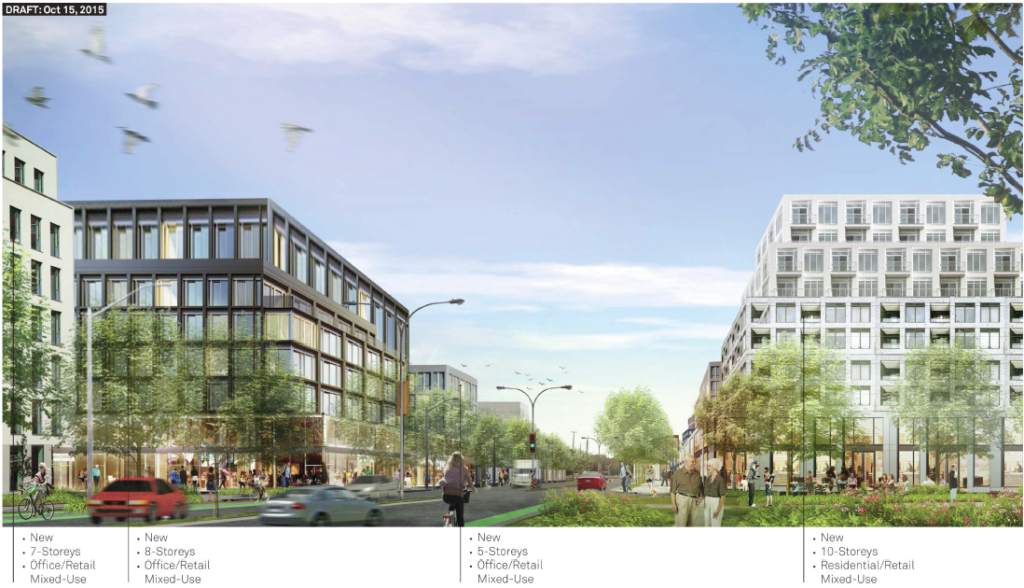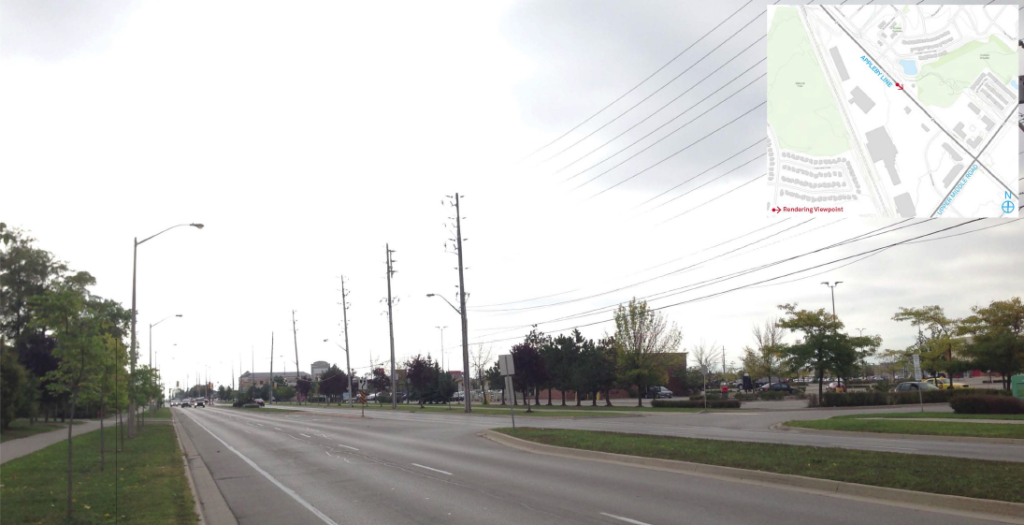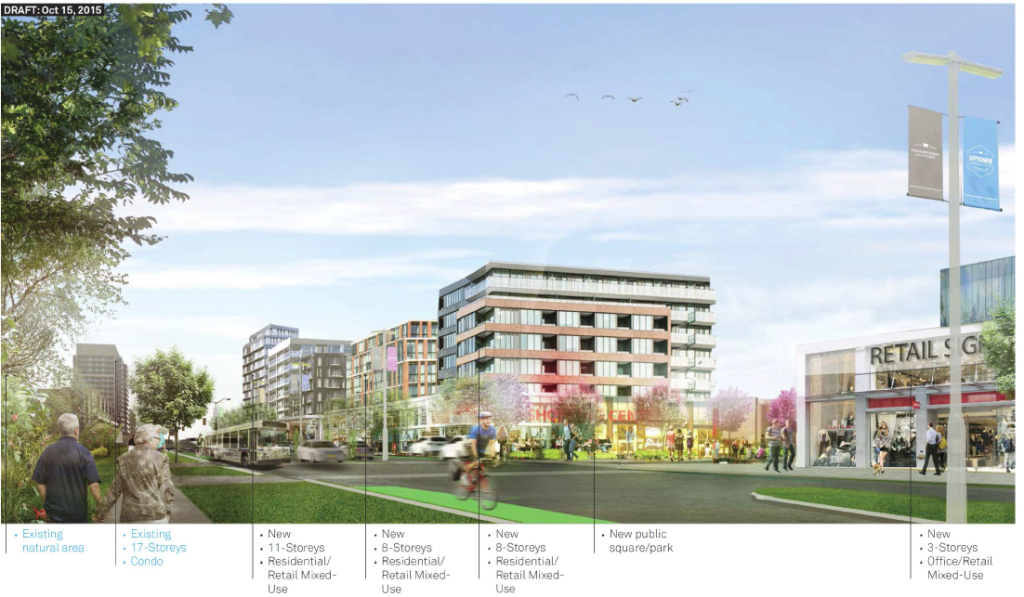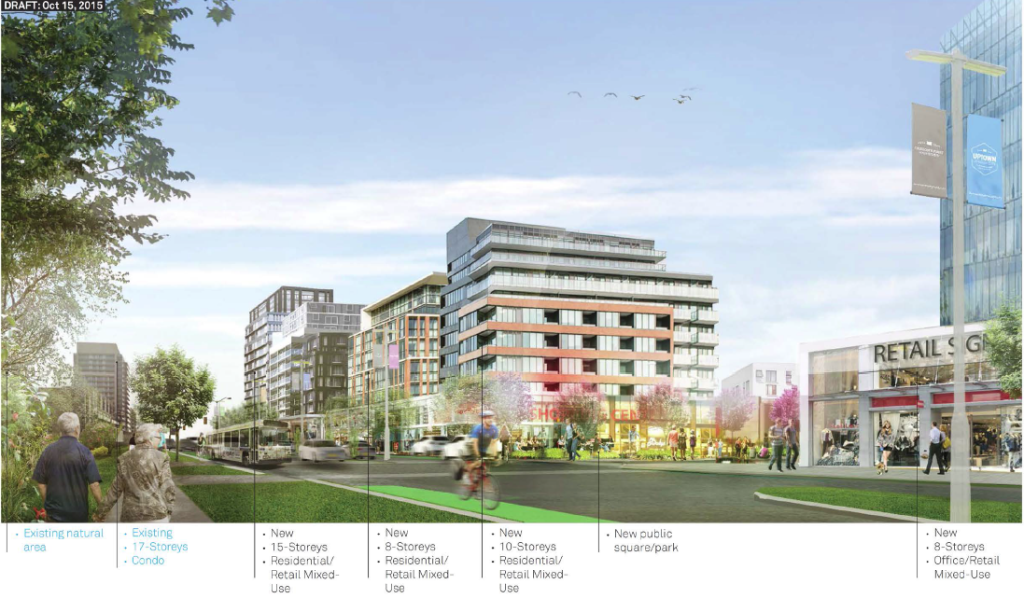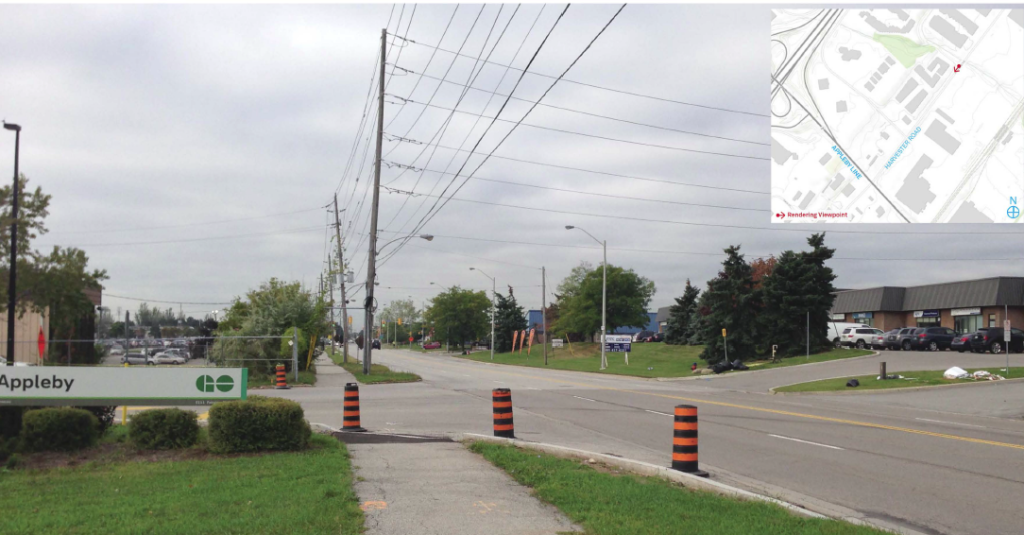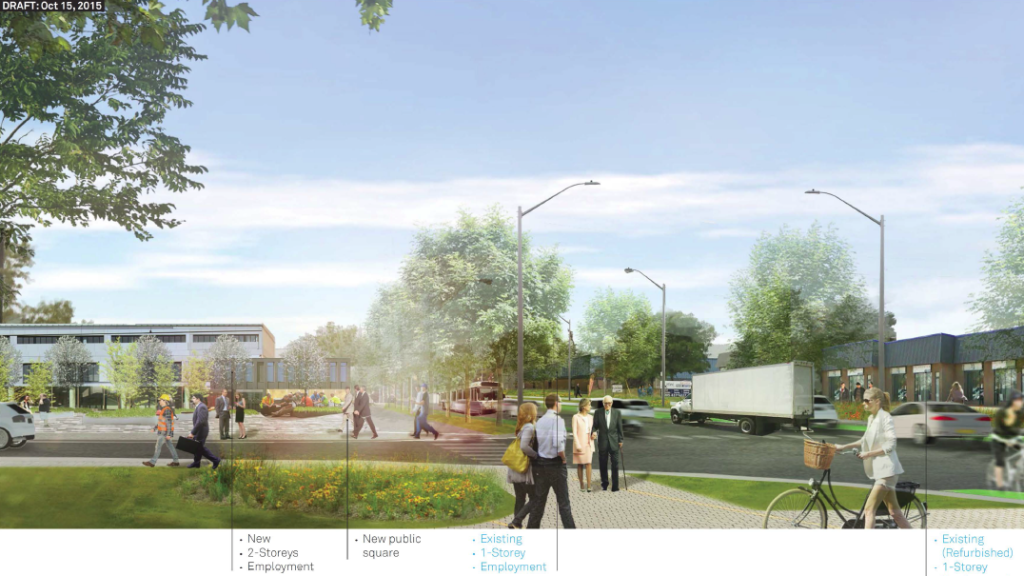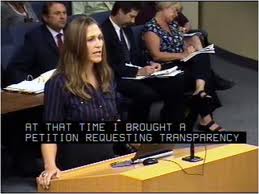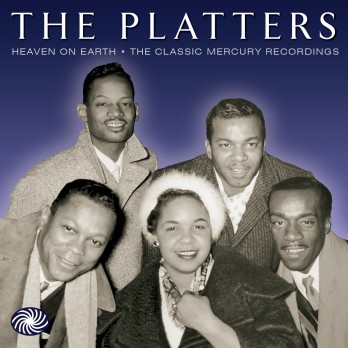 By Pepper Parr
By Pepper Parr
November 2, 2015
BURLINGTON, ON
The doggedly going after Ward 2 Councillor Marianne Meed Ward and the Mayor for answers to questions on why the city did not manage to vote on the development application ADI Development made to put up a 28 storey structure at the corner of Martha Street and Lakeshore Road before the 180 days the city had to approve or turn down the project continues.

The differences of opinion and the different interpretations as to just what is a city council vote for or against a project is centered on the ADI Development project planned for the intersection of Martha Street and LAkeshore Road.
Tom Muir, an Aldershot resident found that he couldn’t follow the time line that was being put out by the city and the ward 2 Councillor and wrote Meed Ward asking her to explain why the city failed to vote on the development application before the 180 day time period the city had to decide on the ADI Development application.
Meed Ward had put some information on her web site but it was confusing.
Muir’s first note was a simple six line request – there was no response.
Muir wrote Meed Ward because he thought her to be a very proactive Councillor who stayed on top of the developments in her ward. He followed up with a second note and copied city manager James Ridge and the Mayor.
Muir had asked “be informed about how the decision was arrived at to allow the 180 day period, mandated by legislation, to elapse before the Council vote was made?”
“I would like an explanation of how the staff report on this project did not make it to Council within the 180 days”, he asked
Muir said that to the best of his knowledge no one has ever been told why city council did not get to vote as a Council on the staff report that had been prepared and approved at the Development and Infrastructure Standing Committee level.
Muir added saying “I would like to know the line of responsibility for this failure that allowed ADI a free pass to the OMB where they now do not have to argue an appeal on a reasoned planning argument. Because the city did not officially vote as a city council against the development ADI is able to argue that the city took no action within the 180 day time frame required under the Planning Act.
“I am asking you this question as the Ward Councillor, but also copying the Mayor and the City Manager as they are the Chief Executives of Council and Staff respectively.
Meed Ward responded:
Thanks for your inquiry and my apologies for the delay in responding. You raise a number of very important and thoughtful points, and these required time to provide an equally thoughtful reply. I trust you will not read anything into the delay other than it took some time to prepare. I acknowledge that it would have been helpful for me to simply acknowledge initial receipt of the email when I got it, and let you know I was working on a reply – I will do that in future so you know I am working on a reply and that it will take some time. My apology for not doing that in this case – I’m sure it would have helped.

All smiles during her campaign for a second term on Council – Marianne Meed Ward asked her constituents to give her their trust.
As this is now a legal matter before the Ontario Municipal Board, I will attempt to give as full a reply to the issues without jeopardizing our case at the OMB and while maintaining confidentiality of any legal matters. The questions you have asked raise important issues of principle and I will attempt to speak to them at that level.
You ask why the 180 day time elapsed, allowing the developer to appeal to the Ontario Municipal Board for a “non-decision” within the legislated time frame. Based on the information I have received, and documented in the time line on my website, this file simply took longer than 180 days to process because of the complexity of the project and the number of agencies that needed to provide feedback. That often occurs with more complex files. We have dealt with several files at recent Development & Infrastructure Committee meetings that have gone beyond 180 days, and developers on these projects have been prepared to work with the city so long as they are assured the file is moving forward and being processed.
The timeline I provided in an earlier article helps to tell the story of the amount of work required on this particular application and that staff worked diligently throughout the process to complete the report in a timely fashion. The staff report had been prepared and the committee was four days away from a vote when the appeal was launched. Typically, an appeal is launched for non-decision when the city is dragging its feet on processing an application. That wasn’t the case here.
Nevertheless, I believe it is a worthwhile question of principle to ask in general: why isn’t every Official Plan Amendment and Rezoning application processed within 180 days and what would it take to make that happen? We know that most applications we will see in Burlington are infill, versus greenfield (having run out of large greenfield areas for redevelopment). We also know that these applications by nature are more complex and take more time to review. So we must ask: what changes would we need to make at City Hall to ensure we can nevertheless even process these more complex applications – all of them – within the timeframe? It is a good question; you and other residents are raising it; and I have asked this of staff internally and we will continue to discuss this over coming weeks and months until we have some suggestions going forward. In my view, if the timeline is there we need to do what we can to meet it, and we need a better understanding of what it will take on these more complex files to achieve that outcome. I am committed to doing what it takes to achieve that outcome going forward.
You have also raised the question of whether the appeal for non-decision within 180 days impacts our position at the Ontario Municipal Board. A non-decision within 180 days is one route to the OMB; the other is disagreement with the decision by council on an application. It is worth noting that the staff report recommending refusal of this particular file was available before the 180 days elapsed.
The developer knew staff were not in support of the project. So the question is: does it make a difference whether a file is appealed for non-decision within 180 days or because the project has not been supported by staff and ultimately council? It’s a good question and one that is being asked on behalf of residents by myself and council. I will continue to investigate this.
However, at the end of the day, the OMB makes its decision based on the planning merits of the application more so than by which route the file ended up at the OMB, whether it was because the 180 days elapsed or because of disagreement with the decision. The planning merits or lack thereof are primary matters for consideration. The city will present our case, outlined very well in the staff report, that the project does not meet the criteria for good planning. Those are the matters that will be considered at the OMB in rendering a decision.
Some residents have asked: does the fact that committee and council voted on the project after it was appealed have an impact on our position at the Ontario Municipal Board? The unanimous vote at committee, upheld by council, to support staff and refuse the project will be part of the information forwarded to the OMB when it is deliberating. So the voice of the residents, via your elected representatives, will be heard and will be part of the information presented at the board.
Muir didn’t like the response he got and called Meed Ward to account with the following;

Tom Muir, a persistent critic of developments that stretch the zoning and Official Plan wanted to know how the city managed to miss an deadline that resulted in a development going to the Ontario Municipal Board. His review of the time line suggested there was more than enough time for staff to produce a report – which they did. The bureaucrats couldn’t seem to get it onto agendas in time to be voted on. Muir wants to know why?
“To cut to the quick, I must say that, sadly, you did not meaningfully answer my September 16 and October 8 requests to be informed about how the decision was arrived at to allow the 180 day period, mandated by legislation as default grounds for OMB appeal, to elapse before the Council vote was able to be made on the staff recommendation report on this project.
“As part of this request, I also asked a number of questions concerning the administrative management staff motivations and thinking that led to this decision. These questions were also not answered, and in fact, were never addressed.
“Instead, your message is a narrative of excuses, rationalizations, and blame-shifting that does not fit the facts contained in the record of city proceedings and timeline in this matter. You also wrote several extended digressions, that collectively muddle, and side-step, the direct point of my inquiry.
“I acknowledge that to some extent you are, as you say, basing your remarks on information you have received from others, and documented in the time line on your website, but there is no attribution on this, and of course, you are responsible for your choice of words. Whatever, I would be careful who you listen to in the future. They may be more interested in self than in you.
“The timeline you document in your March 31 website newsletter, commented Muir is not complete.
“Recall that the prescribed time frame or timeline of 180 days started on September 24, 2014, and elapsed on March 24, 2015.
“Over this entire timeline there were a number of public meetings, staff reports and correspondence available for people to examine. There is no evidence to suggest the planning staff were not in control of the processing timeline, or that they found the file too complex to process in time.
In fact, the ADI project was generally opposed by the public and Council – the Mayor had made it clear he was not on for the project. The staff report was a thorough, fair, and strong planning based recommendation to refuse the application. There are no apparent complicating factors to make the file too complex or unwieldy to process on time, as you imply it was.
“There is also no reason to expect that the refusal recommendation would lead ADI to be prepared to work with the city beyond the prescribed timeline, as you uncritically, and therefore misleadingly, state other developers might do if their application is moving forward.
“I can’t imagine this happening in the face of a known refusal, and the staff record shows that ADI had no intention of negotiating changes. So you certainly can’t shift blame for the failure to meet the timeline to ADI for doing what they did, as you appear to.
“I find your stated insinuation, that despite working diligently, staff were unable to overcome unspecified factors of complexity and time slippage, as you claim, and were only able to prepare the staff report four days before the Committee meeting date to be incorrect, misleading, and totally unfair to the staff working on the file. They cannot defend themselves or set the record straight.
“In fact, the timeline indicates that the staff recommendation report was presented to the then Director of Planning and Building, Bruce Krushelnicki, on March 2, which is 22 days before the 180 day timeline elapsed.
“The staff recommendation report was made public and sent to the Development and Infrastructure Committee on March 13. This means that the staff recommendation report was in Mr. Krushelnicki’s hands for 11 days.
“One has to ask why this 11 days was needed if the planning staff process for the 180 day timeline was considered, as you claim, to be behind time, and if the responsible planning management staff was actually respecting the timeline. Did Mr. Krushelnicki really need 11 days to decide to support his staff, and where is the record of that decision process?
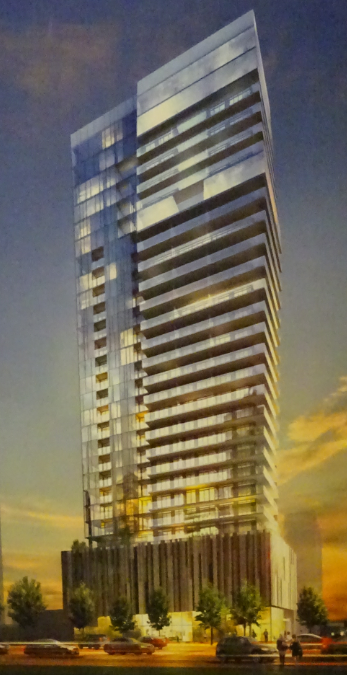
All the fuss and kafuffle is over a tall building on a small lot that stretches the zoning from an acceptable eight storeys to a requested 28
“There is no apparent explanation of this seemingly excessive use of time, given the situation, and its use as an excuse for the failure to meet the deadline of March 24.
“What is also inexplicable is that the staff recommendation report was scheduled to be presented to the D&I Committee on March 30, and to Council on April 20, which puts it outside the 180 day deadline of March 24th. Absolutely too late in the circumstances, and guaranteed to facilitate an ADI appeal to the OMB.
“Even more inexplicable is that there was already a scheduled Council meeting for March 23, one day before the 180 day timeline elapsed. The opportunity for a Council vote on the proposal was squandered with nary a mention.
“Despite all this, four supposedly responsible senior managers ( Bruce Krushelnicki, Director of Planning (now retired and the senior executive overseeing the work of the Ontario Municipal Board); Blake Hurley, Assistant City Solicitor; Scott Stewart, General Manager of Development and Infrastructure; and Nancy Shea Nicol, Interim City Manager at the time and Director of Legal Services), who would have known all these facts especially the expiry of the 180 days on March 24, and the already scheduled Council meeting on March 23.
“In effect, this decision left the back door open for ADI to appeal on the easiest of grounds – that Council had not made a decision within the 180 day mandated time period. The will of the public, and the staff recommendation report, were dead on arrival at Council – this seems to have been done on purpose.
“What were these managers thinking or not thinking? Is this a deliberate action, taken regardless of the consequences for the city and public trust, or just stupid non-thinking?
“My experience in this matter has not been given what I consider to be respect for me, or for the public’s right to be informed with honest and truthful information, and meaningful answers to questions posed.
“I asked serious questions about matters with substantial financial and development implications for the city and residents, and have not received honest and truthful direct answers deserving of respect. Most of what you have said in our correspondence serves to divert attention from the questions, and to prevent understanding of what happened, with a selective set of remarks and excuses that reshape the discussion away from the central issues I raised.
“And while you claim to invite dialogue and debate, you say your response is complete and you have nothing more to add here except by repeating yourself. It’s like you are finishing the job of sweeping things under the rug, and then shutting the lights out on the matter.
“What it looks like is that the city, and senior management (the responsible participants named, earning together about $1 million a year), can do what they want but don’t tell anybody, and they don’t have to account for, or explain, anything about their decisions and actions, or the consequences. They seem to be above having to be answerable, and you look to support this.
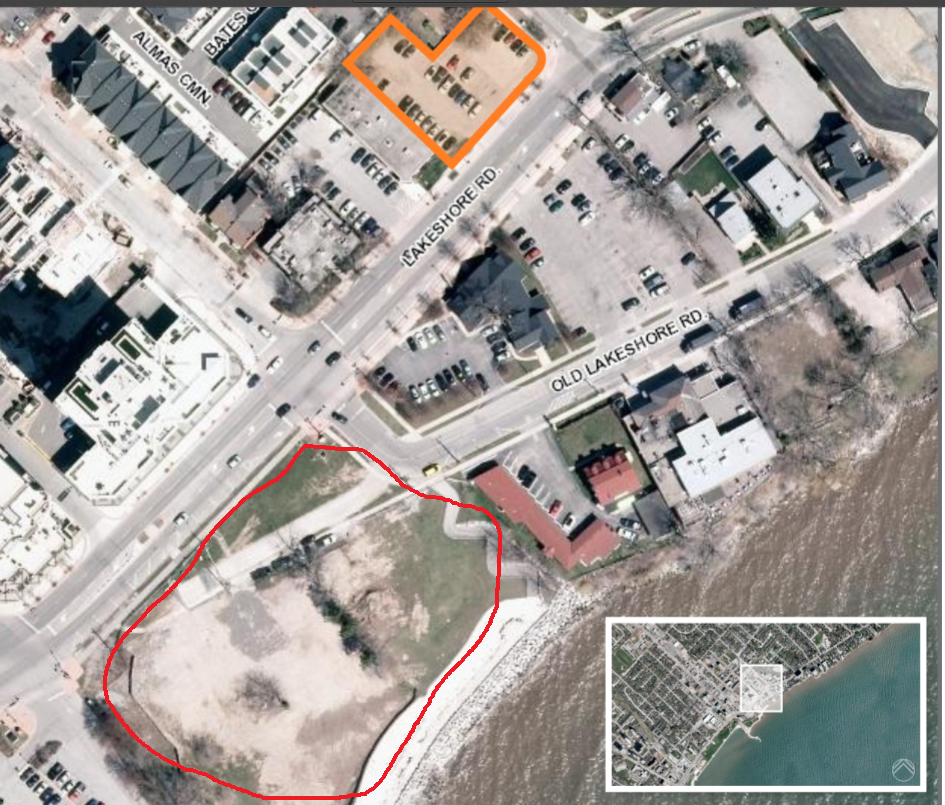
The orange box is where the planned ADI project would bebuilt – the red marker is where a 22 storey condominium, a seven story condominium and an eight storey hotel are to be built – ground will be broken early in the New Year.
“Or is it worse, a case of creative bungling that sabotages the city interest and control over the rational planning of development within the existing Official Plan and policy prescribed framework? This situation could do a lot of damage to the aspirations of city residents to develop according to a plan and process they have chosen.
“How can we trust the legal department to present the city case at the OMB when they participated in this unbelievable muddle – headedness?
“They took the city’s legal right to decide on this development proposal and refuse the application, and gave it away to ADI, and someone from the OMB to decide.
“Is this what the public is supposed to trust and have confidence in as proper, credible administrative implementation of the rules, regulations, and laws?
“Tell us please, how this decision to kill the staff refusal recommendation serves the public and city interest? I want these managers called to account for how the interests of the city and residents are better served by what they have done in this case?
“These points are what most of the other questions in my October 8 reminder message were asking. The responsible staff managers need to be called to account for what they did.
‘In all of this there is a role for the members of council, but particularly yourself, the Ward 2 Councillor, who would know, or be expected to know, all about what I have described here.
‘You knew about the March 24 expiry date of the 180 day prescribed timeframe, and that the scheduled Committee meeting, and particularly the required Council meeting, where the staff recommendation report was on the agenda.
“And yet you remained silent, and went along with what was happening, and what eventually did happen. Why did you remain silent? Did someone advise you to do this, or did you just drop the ball?
“‘You are even musing that maybe the killing of the city will on this development, and the forced OMB hearing, are not such bad things. This is bordering on delusion.
Muir closes with the comment that “We are on a very slippery slope, poised to lose control of development and our Official Plan to speculators.
The debate on the failure of city council to vote on the development application has gone on for some time with two citizens; John and Tom Muir, leading the discussion.
John, a retired engineer, who lives in ward 3 has lived in Burlington for 60 of his 62 years, is proud of the city that his family has called home for three generations, chooses to be anonymous. The Gazette has talked to John – he is real.
He got into the debate with these cogent points with which he refutes several points Meed Ward makes:
“If council had taken the initiative to vote within the 180 days, they would retained their decision making and have shown support for the community input.”
“By voting within the 180 day timeframe, council would have retained the decision making for the city and possibly had the appeal dismissed.”
“We have no guarantee that this appeal would have been filed or if ADI would have the grounds necessary to satisfy the OMB to grant one”
John added: “I believe this is where the city legal team should take over, helping to clarify some of the possibilities during your review.”
John closed his comments to Meed Ward with: “There are many disturbing issues and questions that have come forward as a result of this file, your review is a start.”
The simplest and obvious way to avoid such possible questions and inferences is for the city and participants to explain their decisions and actions, as I initially asked. However, in the present situation, nobody is talking, the stakes are high, and the ADI sales promotion, public relations, and propaganda mill is getting in full swing. So what are people to think? We are not stupid.
I hope you are not suggesting that we the public – in order to be “respectful” – avoid hard questions of trust, transparency and accountability because they are, to quote you, distractions from important issues worth discussing and debating?
October 28th Meed Ward responded with: “Happy to meet to discuss further and clear this up. It seems clear email correspondence is adding more confusion and concern because of how writings are interpreted.
Muir took initially took a pass on the offer to discuss the concern any further with Meed Ward. He was still waiting for a “meaningful answer” from the Mayor.
Meed Ward did say:
Even more important staff will provide further clarity on what, if any, impact it has on our standing at the Ontario Municipal Board that an application arrived at the OMB for exceeding the 180 days, or arrived at the OMB for disagreement with the decision. Our understanding has been that it has little, if any, impact on the outcome of a decision how an application gets there. Nevertheless, I’ve asked for more clarity on that.
I invite dialogue and debate within the community and welcome differences of perspective; that makes us stronger and deepens each of our understanding of important issues. I have always requested that this dialogue be respectful, not make personal attacks or assume negative or ulterior motives of any of the participants. Your communications were not respectful of the participants in this matter, which is unfortunate because it distracts from important issues worth discussing and debating.
John comments that: “We will have a glimpse in December and a complete story in March or April, it will make fascinating reading.
Meanwhile the ADI people continue to actively market the property and Tom Muir continues to wait for the WORDS promised by the Mayor on October 8th.
The time line that Muir put together:
The time line for the ADI project began on September 24, 2014, and elapsed on March 24, 2015.
Over timeline there are a number of public meetings, and staff reports and correspondence available to examine and there is no evidence that the working planning staff were not in control of the processing timeline, or found the file too complex to process in time.
The staff report was a thorough, fair, and strong planning based recommendation to refuse the application. There are no apparent complicating factors to make the file too complex or unwieldy to process on time, as you imply it was.
The timeline indicates that the staff recommendation report was presented to the then Director of Planning and Building, Bruce Krushelnicki, on March 2, which is 22 days before the 180 day timeline elapsed.
The staff recommendation report was made public and sent to the Development and Infrastructure Committee on March 13. This means that the staff recommendation report was in Mr. Krushelnicki’s hands for 11 days.
There is no apparent explanation of this seeming excessive use of time, given the situation, and its use as an excuse for the failure to meet the deadline of March 24.
What is also inexplicable is that the staff recommendation report was scheduled to be presented to the D&I Committee on March 30, and to Council on April 20.
On October 29th Councillor Meed Ward published a piece in her Ward Newsletter in which she attempts to convince her constituents that city council did indeed vote against the ADI project.
Council did no such thing – what Council did do was accept the amended report from the Development and Infrastructure (D&I) committee that met on March 30th.
Meed Ward in her Newsletter said: “The recommendation from D&I to endorse staff’s recommendation to refuse the proposed development went to the April 20 council meeting. Council voted to uphold that recommendation as part of the motion to affirm the recommendations from all standing committees.
To have standing as a decision, city Council had to actually vote on the question. They did not do so – to suggest that they did is a slight of hand usually seen by gamblers who want to pull a fast one.
Is there a fast one being pulled?

Sales office for the Adi Development at the corner of Brant and Pine. The project is being heavily promoted with bonuses and benefits for the real estate agents who deliver clients.
It is hard to tell – why this Council cannot just admit that they screwed up and while they are at it explain why the report was in the hands of the Planning Director and not on its way to the Development & Infrastructure Standing Committee where it would be debated and sent along to city council where a vote that has legal standing would be made.
As for that promise made by the Mayor to Tom Muir on October 8th when he wrote
In an email to ward 2 Councillor Meed Ward and copied to Tom Muir on October 31st, the Mayor said:
“Thanks Marianne for addressing all of Tom’s questions.”
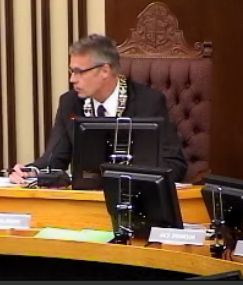
Mayor fails to deliver on his “meaningful response” to a citizen who questions why city council failed to vote on a major project within the legislated time frame – resulting in the project going to the OMB.
The Mayor basically washed his hands of the matter – so much for his understanding of what a “meaningful response” is – the public still doesn’t know why city council didn’t vote on one of the most controversial development applications to come before it in some time before the expiry of the 180 day deadline that everyone knew about.
Something doesn’t smell right.
Opinion: Salt with Pepper































